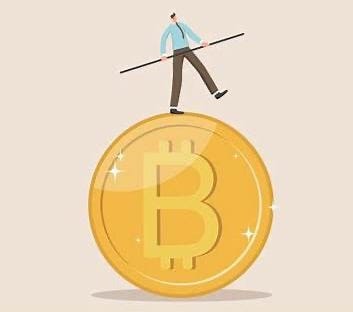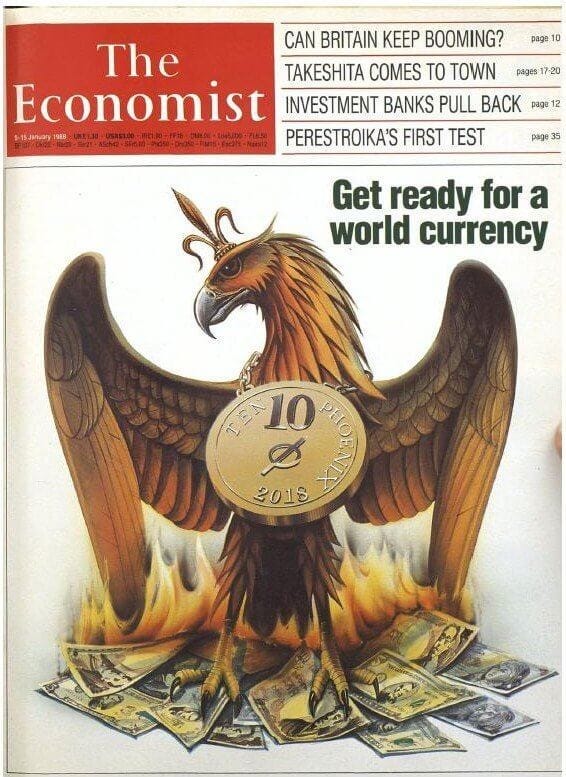Can Bitcoin & the Dollar Coexist?
A New Dual Mandate for Global Financial Stability
I. A Dual Future for Money
This weekend, my daughter and granddaughter disagreed about white lights or colored lights for our Christmas tree. I did a little research and found out that now you can buy programmable lights and have either whenever you want, including the twinkling variety. It struck me as the perfect metaphor to describe the main thesis of this essay. Sometimes, thanks to technology, you can have things both ways.
The future of money will be about choices as well. Cryptocurrencies like Bitcoin don't have to replace traditional finance; they can coexist and complement it. This article explores the risks, opportunities, and future of integrating these two systems—a journey through history, technological innovation, and the geopolitics of global finance. It goes without saying that my purpose is not to recommend or not recommend investing in any form of crypto, but to provide a framework for analysis that aligns with reality, not opinion.
📚 Estimated Reading Time: 30 minutes — A comprehensive exploration of cryptocurrencies, the risks they pose and solutions they bring to traditional finance. For readers ready to do a deep dive into the future of money.
❝ People use Bitcoin as a speculative asset. It’s like gold—it’s just virtual and digital… it's not a competitor for the dollar; it's really a competitor for gold.
Federal Reserve Chair Jerome Powell, DealBook Summit, Dec 4, 2024
There are two ways to react to innovation. One is to be skeptical—why do we need automobiles when a horse and buggy work so well? Another response is to be exhilarated at the prospect of change, especially when the present is not working. I belong in the latter, early adopter camp, and have a garage full of early versions of almost every type of electronics, including my treasured Apple II. The day I bought it, I took it out of the box and by the time I looked up, it was dawn.
When I first learned about cryptocurrencies many years ago now, I felt the same way and spent a lot of time, as they say, doing my own research and talking to people on both sides of the debate over its utility. My purpose is to share what I have learned, and also to convey my deep sense of excitement about the future of money. However, I don’t think crypto will replace the US dollar anytime soon. Instead, my vision is of a new global financial architecture that combines the best features of both.
II. Bitcoin’s Strategic Potential
Bitcoin as a Reserve Asset
Bitcoin’s recent surge past $100,000, part of what Niall Ferguson has termed “an economic chain reaction” to the incoming crypto-friendly Trump Administration, is bound to intensify the debate about its role in the global financial system. As the price rises, the urgency to establish a Strategic Bitcoin Reserve increases. The US government will face competition from institutional investors like MicroStrategies (MSTR) unless they act soon. In fact, MSTR just bought $1.5B of Bitcoin today, and the price surged to an all-time high of $106,000. Game Theory works.
Fed Chair Jay Powell’s comparison of Bitcoin to gold underscores its growing influence as a store of value. At the same time, John Plender’s recent article in the Financial Times, “Stand By for Financial Instability” highlights the potential risks that cryptocurrencies might pose to central bank authority and global financial stability.
Plender does not support the creation of a US Strategic Bitcoin Reserve. He warns that cryptocurrencies could spark “financial instability, bailouts, and the risk of recession”. In spite of these types of reservations, Bitcoin seems to have sailed past the point of no return. With increasing tailwinds, it is turning into an undeniable economic force.
Establishing a Bitcoin reserve would help maintain US leadership in global finance and spur much-needed innovation. By allowing, and encouraging traditional finance (TradFi) and decentralized finance (DeFi) to coexist, we can increase efficiency, inclusivity, security, and resilience—benefiting both.
To understand Bitcoin’s role in this evolving geoeconomic landscape, we should consider its potential to become a global reserve currency in light of historical economic thought.
Bitcoin as a Global Currency
Economists have long imagined a global currency, and I think we are on our way there, much faster than we think, thanks to technology and a positive policy environment in the world’s leading economy, the US.
Bitcoin’s market cap now exceeds the British pound, once the world’s reserve currency. A de facto US Bitcoin Reserve already exists, since the US government owns 1% of the 1.9 million coins now in circulation. (By comparison, US gold reserves are about 4.3% of all known stores of gold.)1
More than a new asset class, as Jay Powell described, an intriguing concept is the potential for Bitcoin to become a global currency, and the benefits that might have, especially for developing countries.
In 2012, in the aftermath of the Eurozone crisis, I had a conversation with Nobel economist Robert Mundell, known as the “Father of the Euro”. I asked him if he had changed his mind in light of the euro’s bumpy ride, and whether he thought the currency union was a mistake. He immediately and forcefully replied that no, the euro was just one step towards creating a non-sovereign global currency, and the only way for developing countries to prosper.
In “A Theory of Optimum Currency Areas” 2 Mundell describes the need for a global monetary system to create stability and avoid exchange rate volatility, which is especially disadvantageous for smaller and poorer countries. (He called his global money the “intor” a combination of international and the French word for gold.)
In a speech in 2003, Mundell recounted the policy discussion about a global currency in the aftermath of Bretton Woods, in 1944:
❝ The proposal for a world currency today sounds radical, but you should know that it was not completely removed from advanced thinking sixty years ago. In 1941, President Franklin D. Roosevelt, directed his Secretary of the Treasury, Henry Morgenthau Jr., to make plans for the post-war economic order. In this directive he was explicit about the need for making provision for the world currency. Harry Dexter White, who was then Director of Research at the Treasury, was put in charge of preparing the American plan. This plan included a global currency called ‘unitas.’ 3
Great Britain came up with their own plan, which John Maynard Keynes called the bancor. Given the erstwhile rivalry for financial dominance between the US and Great Britain, it is not surprising that the US slow-walked this plan. It was the intention of US officials that the dollar would dominate the postwar global economy—and it did. The lesson: a global currency must be extraterritorial and neutral.
Paul Volcker, who knew a thing or two about central banking and inflation, was also in favor of a global currency. In 2009, ironically the same year that Bitcoin was created, Volcker “argued that the ‘ultimate logic’ of an international financial system was a world currency but acknowledged that there were no credible alternatives to the dollar for ‘many tomorrows’. “ 4
Crypto proponent and tech visionary Balaji Srinivasan's recent tweet aligns well with Mundell and Volcker’s vision:
❝ Bitcoin is already the global reserve asset. Anyone can buy or sell virtually any amount of BTC at any time in any country on any device for a known price without any necessary intermediary. Nothing else is like this.
Could Bitcoin fill the role of a global currency? I believe it could succeed because it is immune to local political interference due to its cryptographic security. The use of mathematics to protect data and secure transactions means that the Bitcoin blockchain is tamper-proof and democratically accessible to owners of the coins it produces. No nation can alter it.
The answer to the question about the future of money requires an understanding of economics, technology, politics, and human behavior, rooted in historical theories about what constitutes money.
Bitcoin’s potential stems from a longstanding desire to create an extraterritorial monetary system and raises broader questions about why crypto matters today. Understanding Bitcoin's potential as a reserve currency helps frame its broader impact.
III. Risks & Opportunities: Why Geopolitics Favor Crypto
Keep reading with a 7-day free trial
Subscribe to econVue to keep reading this post and get 7 days of free access to the full post archives.





